How to Find Lodging With Good Wi-Fi
For many travelers, having consistent and functional Wi-Fi is critical. After having an extremely frustrating stay in Capetown, South Africa — where the Wi-Fi was so bad that TPG writer JT Genter and I retreated to a nearby bar multiple evenings to work — I developed a process to find lodging with adequate Wi-Fi.
Using this process, I've been able to consistently get good Wi-Fi since the Capetown stay. Even in places with generally poor internet quality, like Saipan, the Marshall Islands and Mongolia, I was able to find a decent connection. Here's what you need to know to do the same.
[table-of-contents /]
What's Good Enough?
What's good enough will vary for each person. If you want to sync your phone to read and send emails, you won't have any hard requirements except that there's functional Wi-Fi. However, if you need to host stable, high-quality video chats, you'll want at least 10Mbps upload and download bandwidth. A low latency will make your work flow easier and obviously, the better the bandwidth and latency, the happier you'll be while working.
However, remember that in most cases you're sharing the internet bandwidth with other users. If other users are downloading large files, video chatting or gaming, this'll negatively affect the speeds you get. This is why Wi-Fi at hotels is often terrible when many guests are around: in the morning and evening.
Location Matters
Average internet quality varies greatly from city to city. Although experience has taught me not to trust these sites completely, you can get an idea of a city's internet quality from NomadList and Bandwidth Place.
NomadList explicitly says their internet speeds are obtained from many sources and represent the average internet speed that can be expected at hotels, rentals and coffee shops.
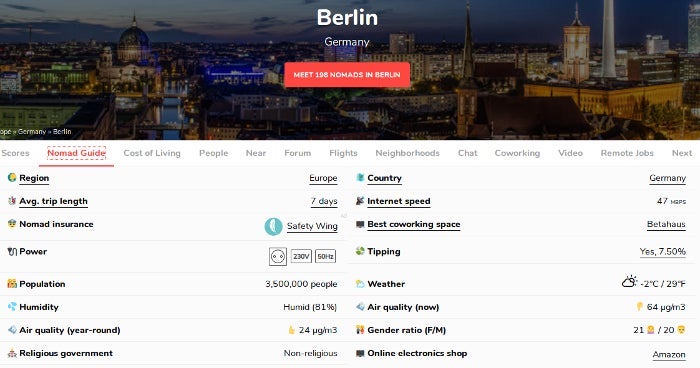
Bandwidth Place reports the average download and upload speeds reported across all devices tests on their website in different cities.
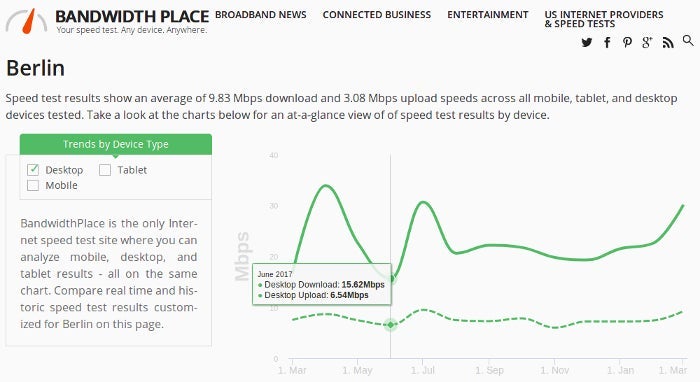
Even within a particular city, internet quality can vary greatly based on what provider is used and what speeds are guaranteed from the provider. For this reason, I recommend considering hotels and rentals one by one.

Hotels
If you don't have a specific hotel in mind, take a look at hotelwifitest to see what hotels have tested well in your destination city. In popular cities, the website has gathered enough information to have averages for many hotels as well as confidences in these estimates.
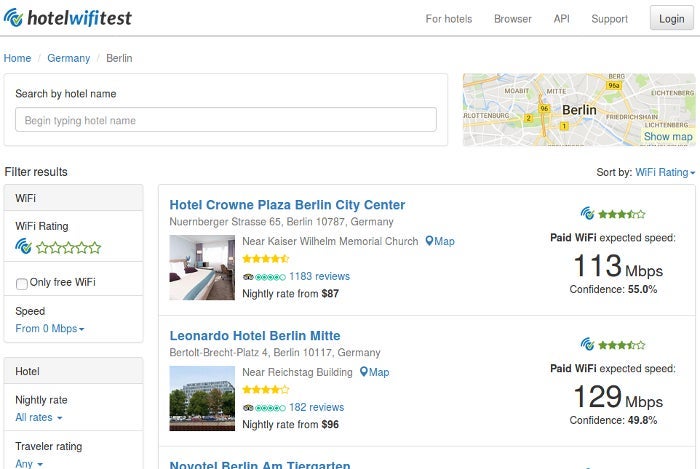
Unfortunately, in less popular or smaller cities — where the internet is apt to be lower quality and picking the best hotel may be more important — the website often lists limited hotels with estimated rates — which certainly limits the usefulness of this site.
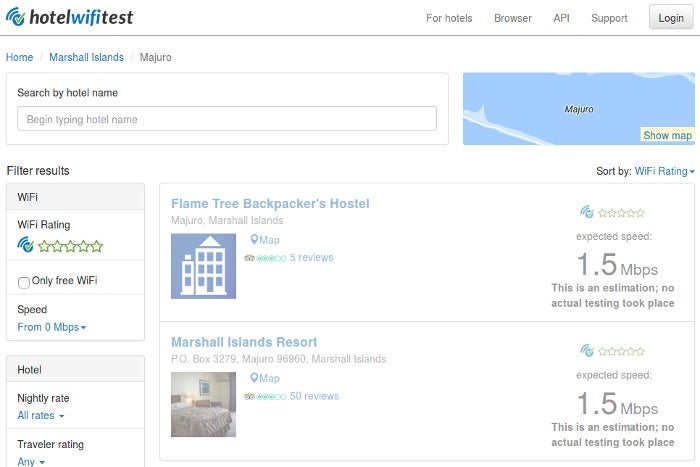
Once you've narrowed your choices down to a few hotels, I recommend checking online reviews. My first stop for checking Wi-Fi reviews is Booking.com since they offer Wi-Fi ratings and the ability to sort reviews using a "Wi-Fi" filter.
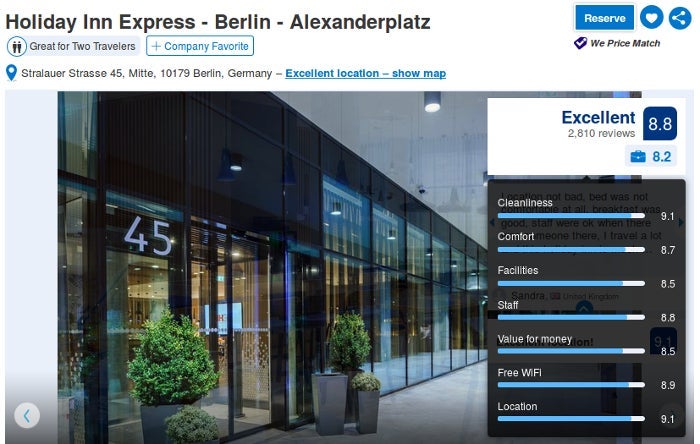
I compare both the Wi-Fi rating — which guests who book through Booking.com rate as part of their general review — and the text reviews for the hotels I'm considering. If possible, I eliminate any hotels that have more negative than positive reviews related to internet and if I have enough options, I'll eliminate any hotels that have a negative review related to internet connectivity.
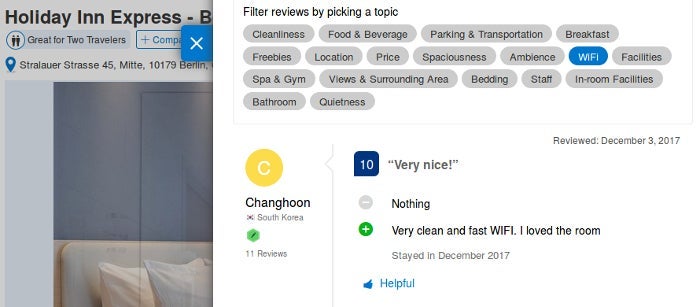
Tripadvisor also offers the ability to filter reviews by a search term. However, I give Tripadvisor reviews less weight since any one can write a review and there's no check that reviewers have stayed at a hotel before reviewing it. Plus, Tripadvisor is known to sometimes delete negative reviews.
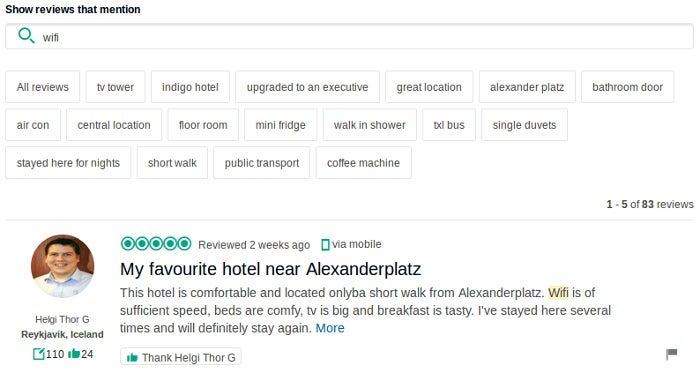
If high-quality internet is especially important for a stay, I'll also reach out to the hotel regarding expected internet speeds, throttling, maximum connections and whether they block VPNs.
Rentals
Airbnbs or other rentals can be more of an unknown due to less reviews. However, one benefit is that you can easily contact the host to ask questions before booking. Hosts are motivated to keep their response times low and their occupancy rates and review scores high, so they're likely to answer questions quickly and honestly.
On Airbnb, I read the property listing carefully and browse through reviews. If I'm still interested, I'll filter the reviews using a word like "internet" or "laptop." If the reviews and information in the property listing lead me to feel certain the Wi-Fi will be excellent, then I book.
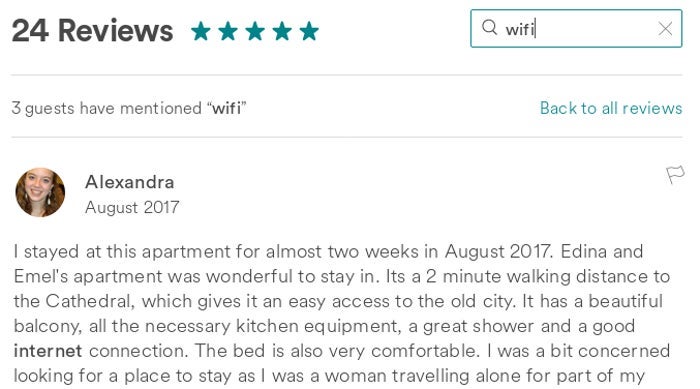
If I have any questions or doubts, I'll reach out to the host on the Airbnb platform and state that I need to work online during my stay and that I'm curious about expected internet speed. Depending on the city and my needs, I may also ask about data caps, throttling and whether the listing has its own dedicated router. These questions get you the answers you need and also lets the host know you'll likely be using a lot of internet.
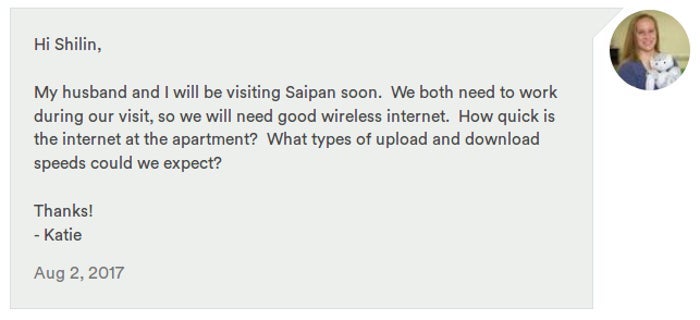
Another benefit of asking these questions before booking is that if the internet ends up being unusable, you'll have more luck if you need to get Airbnb involved to change your lodging. I haven't personally experienced this, but there are multiple reports online of digital nomads having success getting Airbnb involved when the internet at their rental was much worse than the host claimed before booking.
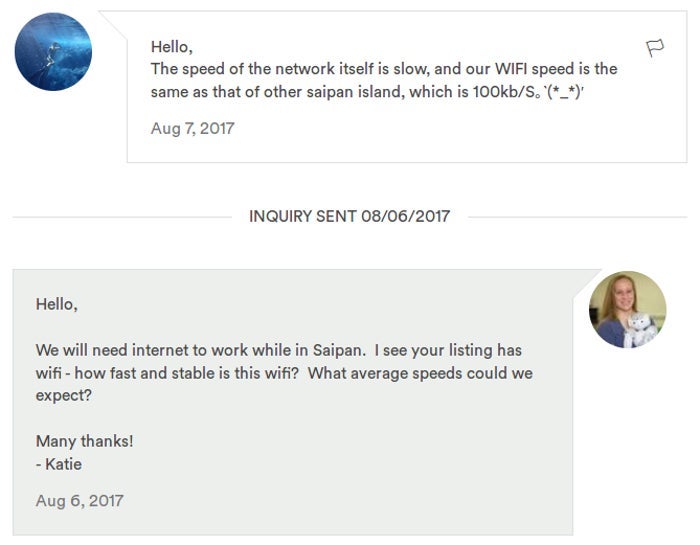
Improve Your Odds
Once at your chosen lodging, you can do a few things to improve your chances of having a good Wi-Fi experience.
Room Location Matters: Ask for a room near a wireless router as being closer to the router should improve your connection.
Connect via Wire: Plug into an Ethernet port using an Ethernet cable if provided; the wired connection should be more stable.
Install an External Adapter: Use an external adapter to increase your laptop's Wi-Fi signal strength. This will allow your laptop to pick up networks that are farther away. However, make sure to buy an adapter that'll work easily with your operating system. (JT has had success using the plug-and-play ANEWKODI 600Mbps USB Wi-Fi Adapter with his Windows laptop.)
Use Full Power: Make sure your network adapter is transmitting at full power. This setting can be adjusted through the adapter's driver interface program; ensuring that your laptop isn't in power-save mode will usually keep your laptop from decreasing the adapter's range and signal strength.
Disable Background Tasks: Background tasks may be using valuable bandwidth. Disable unused applications and notifications to get maximum bandwidth for your primary tasks.
Bottom Line
If you work while traveling, Wi-Fi quality can make or break a stay. Even if you travel for pleasure, reliable connectivity certainly makes the trip better. Granted, many hotels in modern business cities will have Wi-Fi that is adequate for most travelers, so less work needs to go into finding the hotel with the best Wi-Fi. But when traveling to less-connected cities, researching and planning ahead can prevent frustration and many headaches.
TPG featured card
at Capital One's secure site
Terms & restrictions apply. See rates & fees.
| 5X miles | Earn 5X miles on hotels, vacation rentals and rental cars booked through Capital One Travel |
| 2X miles | Earn unlimited 2X miles on every purchase, every day |
Pros
- Stellar welcome offer of 75,000 miles after spending $4,000 on purchases in the first three months from account opening. Plus, a $250 Capital One Travel credit to use in your first cardholder year upon account opening.
- You'll earn 2 miles per dollar on every purchase, which means you won't have to worry about memorizing bonus categories
- Rewards are versatile and can be redeemed for a statement credit or transferred to Capital One’s transfer partners
Cons
- Highest bonus-earning categories only on travel booked via Capital One Travel
- LIMITED-TIME OFFER: Enjoy $250 to use on Capital One Travel in your first cardholder year, plus earn 75,000 bonus miles once you spend $4,000 on purchases within the first 3 months from account opening - that’s equal to $1,000 in travel
- Earn unlimited 2X miles on every purchase, every day
- Earn 5X miles on hotels, vacation rentals and rental cars booked through Capital One Travel
- Miles won't expire for the life of the account and there's no limit to how many you can earn
- Receive up to a $120 credit for Global Entry or TSA PreCheck®
- Use your miles to get reimbursed for any travel purchase—or redeem by booking a trip through Capital One Travel
- Enjoy a $50 experience credit and other premium benefits with every hotel and vacation rental booked from the Lifestyle Collection
- Transfer your miles to your choice of 15+ travel loyalty programs
- Top rated mobile app


